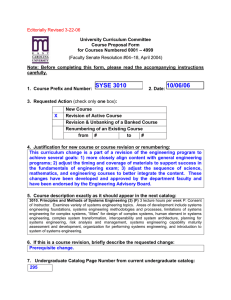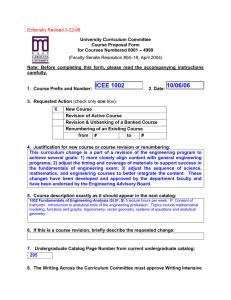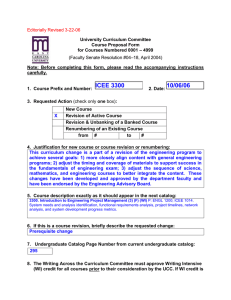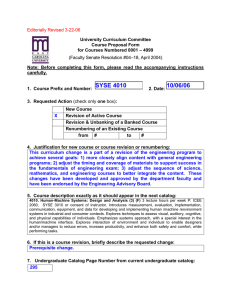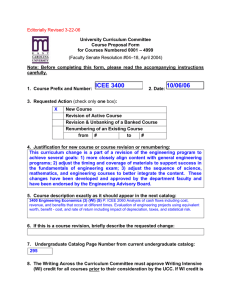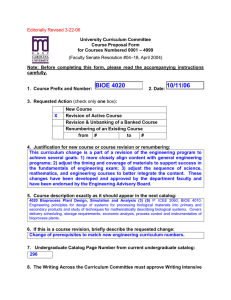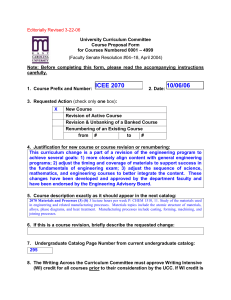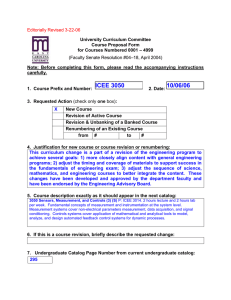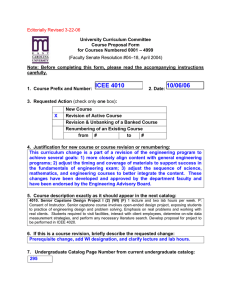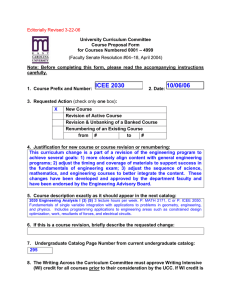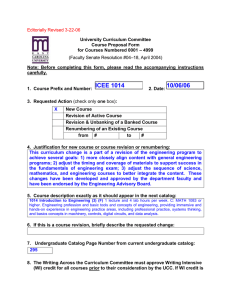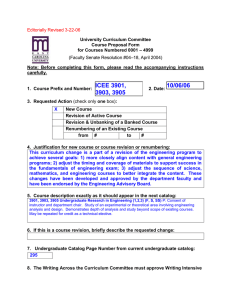BIOL 3740, 3741
advertisement
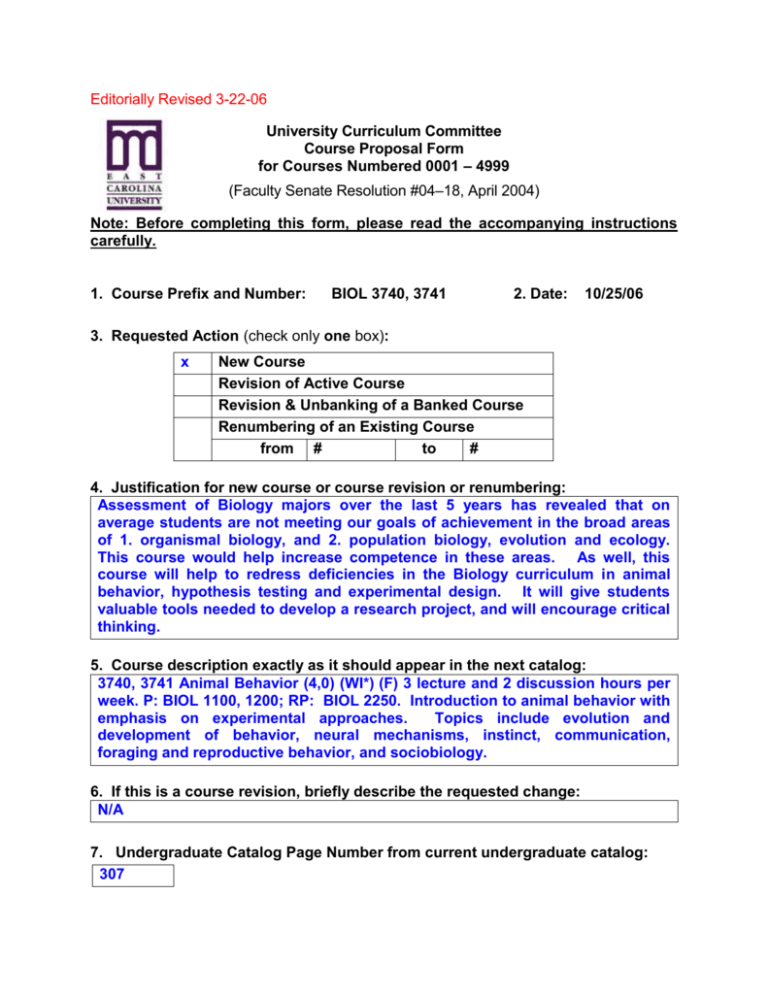
Editorially Revised 3-22-06 University Curriculum Committee Course Proposal Form for Courses Numbered 0001 – 4999 (Faculty Senate Resolution #04–18, April 2004) Note: Before completing this form, please read the accompanying instructions carefully. 1. Course Prefix and Number: BIOL 3740, 3741 2. Date: 10/25/06 3. Requested Action (check only one box): x New Course Revision of Active Course Revision & Unbanking of a Banked Course Renumbering of an Existing Course from # to # 4. Justification for new course or course revision or renumbering: Assessment of Biology majors over the last 5 years has revealed that on average students are not meeting our goals of achievement in the broad areas of 1. organismal biology, and 2. population biology, evolution and ecology. This course would help increase competence in these areas. As well, this course will help to redress deficiencies in the Biology curriculum in animal behavior, hypothesis testing and experimental design. It will give students valuable tools needed to develop a research project, and will encourage critical thinking. 5. Course description exactly as it should appear in the next catalog: 3740, 3741 Animal Behavior (4,0) (WI*) (F) 3 lecture and 2 discussion hours per week. P: BIOL 1100, 1200; RP: BIOL 2250. Introduction to animal behavior with emphasis on experimental approaches. Topics include evolution and development of behavior, neural mechanisms, instinct, communication, foraging and reproductive behavior, and sociobiology. 6. If this is a course revision, briefly describe the requested change: N/A 7. Undergraduate Catalog Page Number from current undergraduate catalog: 307 2 8. The Writing Across the Curriculum Committee must approve Writing Intensive (WI) credit for all courses prior to their consideration by the UCC. If WI credit is requested, has this course been approved for Writing Intensive (WI) credit? Yes No Yes If Yes, will all sections be Writing Intensive (yes/no)? Yes No No 9. Any course requesting Foundations Curriculum credit must be reviewed by Academic Standards Committee prior to their consideration by the UCC. If FC credit has been approved by the ASC, then check the appropriate box (check at most one), otherwise leave all boxes blank. English (EN) Humanities (HU) Fine Arts (FA) Health (HL) 10. Course Credit: Lecture 3 Hours 2 Lab Science (SC) Social Science (SO) Mathematics (MA) Exercise (EX) Per Term Per Weekly OR Term Per Studio Weekly OR Term Per Practicum Weekly OR Term Per Internship Weekly OR Term Other (e.g., independent study) Please explain. Weekly OR Credit Hours Credit Hours Credit Hours Credit Hours Credit Hours Total Credit Hours 4 11. Anticipated yearly student enrollment: 40 12. Affected Degrees or Academic Programs: s.h. s.h. s.h. s.h. s.h. s.h. 3 Degree(s)/Course(s) 13. Current Catalog Page Changes in Degree Hours Overlap or Duplication with Affected Units or Programs: Not Applicable x Applicable (notification and responses from affected units are attached) 14. Approval by the Council for Teacher Education (required for courses affecting teacher education programs): x Not Applicable Applicable (CTE has given its approval.) 15. Statements of Support: x Current staff is adequate Additional staff is needed (describe needs in the box below): x Current facilities are adequate Additional facilities are needed (describe needs in the box below): x Initial library resources are adequate Initial resources are needed (in the box below, give a brief explanation and an estimate for the cost of acquisition of required initial resources): x Unit computer resources are adequate Additional unit computer resources are needed (in the box below, give a brief explanation and an estimate for the cost of acquisition): ITCS resources are not needed The following ITCS resources are needed (put a check beside each need): 4 x Mainframe computer system Statistical services Network connections Computer lab for students (* occasional use only) Remember to forward email approval from the director of ITCS to UCC. 16. Syllabus – please insert course syllabus below. You must include (a) the name of the textbook chosen for the course, (b) the course objectives, (c) the course content outline, and (d) the course assignments and grading plan. (a) Text: John Alcock 2005 Animal Behavior 8th edition Reader: Paul W. Sherman and John Alcock 2005. Exploring Animal Behavior: Readings from American Scientist 4th edition (b) Objectives: This course will introduce students to the field of animal behavior reviewing classical behavioral studies through to modern interdisciplinary approaches. The course will emphasize experimental design, objectivity and ethics in behavioral studies. Students taking this course will gain the ability to critically evaluate studies in animal behavior skills in researching a scientific report using the primary literature the ability to develop a hypothesis with testable predictions experience in designing an experiment experience in collecting and analyzing behavioral data scientific writing skills confidence in critical thinking (c) Course content outline: Week 1 Week 2 Week 3 Week 4 Week 5 Week 6 Week 7 Week 8 Week 9 Lecture topics Evolution of behavior Levels of analysis Development of behavior Neural mechanisms Organization of behavior Instinct and adaptations for survival Foraging behavior Midterm exam Migration and territoriality Communication 5 Week 10 Week 11 Week 12 Sex roles and mate choice Mating systems Parental care Research paper due Week 13 Social behavior Week 14 Human Behavior Final exam (d) Assignments and grading plan: Lab reports / participation Midterm exam Research paper Final exam 30% 20% 20% 30% Grading Scheme (12.5 point scale) A 87.5-100 B 75-87 C 62.5-74.4 D 50-62 F <50 The research paper will be written in the format of a proposal. Students will research and design an appropriately controlled lab- or field-based behavioral experiment with attention to both scientific objectivity and ethical considerations. The students will develop their own hypotheses based on literature research, and formulate testable predictions. Students will be evaluated on the originality, feasibility, and scientific rigor of their proposals as well as their ability to communicate their ideas in writing.
